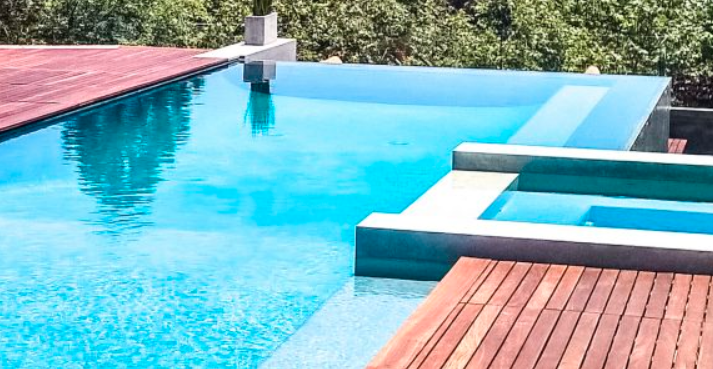Infinity vs. Overflow Pools: What’s the Difference and Which is Right for You?

When considering a new swimming pool for your home, the choice of design can significantly impact both aesthetics and functionality. Two popular options that often confuse homeowners are infinity pools and overflow pools. While they may seem similar at first glance, they have distinct characteristics that cater to different preferences and needs. In this article, we’ll explore the differences between infinity and overflow pools, and their advantages, and help you determine which one is the right fit for your outdoor oasis. For more information check out pool company in dubai
Understanding the Basics
Infinity Pools
Also known as vanishing edge pools, infinity pools create an optical illusion where the water appears to extend infinitely into the horizon. This effect is achieved by designing one or more edges of the pool lower than the water level, allowing water to flow over the edge and creating a seamless transition between the pool and the surrounding landscape, such as the ocean, mountains, or valleys.
Overflow Pools
Overflow pools, on the other hand, are designed to allow water to flow over the pool’s edges into a catch basin or trough surrounding the pool. This design ensures that the water level remains constant and can provide a dramatic visual effect, particularly when integrated with beautiful landscaping or hardscaping. The water then returns to the pool through a system of pumps and filters.
Read also: How Rangoli Art Enhances Your Home’s Festive Ambiance
Key Differences
- Water Flow Design
- Infinity Pools: Water flows over one or more edges, creating the illusion of an endless horizon. The primary visual effect is the smooth transition from water to the surrounding environment.
- Overflow Pools: Water overflows from all sides or specific edges, providing a consistent water level. This design gives a more traditional look while still creating a luxurious feel.
- Visual Impact
- Infinity Pools: Best suited for locations with stunning views, as they enhance the landscape and provide a breathtaking aesthetic. The design is often associated with high-end resorts and luxury homes.
- Overflow Pools: These pools can also offer a dramatic appearance, but they may be more versatile in various settings. They work well in compact spaces and can create a cohesive look with surrounding landscaping.
- Maintenance and Cost
- Infinity Pools: Due to their complex design, infinity pools often come with higher construction and maintenance costs. The edge design requires precise engineering and ongoing maintenance to ensure the water flow remains unobstructed.
- Overflow Pools: Generally, overflow pools may be less expensive to construct than infinity pools. Their simpler design can also make maintenance easier, but they still require regular upkeep to manage water quality and flow.
Advantages of Each Pool Type
Infinity Pools
- Stunning Views: The vanishing edge creates a mesmerizing effect, making them ideal for properties with spectacular landscapes or ocean views.
- Unique Aesthetics: The visual appeal of an infinity pool can elevate the overall ambiance of your outdoor space, making it a desirable feature for luxury homes.
- Resort-Like Experience: Infinity pools are often associated with high-end resorts, giving your backyard a lavish feel that is perfect for relaxation and entertaining.
Overflow Pools
- Consistent Water Level: Overflow pools maintain a stable water level, which can enhance the swimming experience and improve water circulation.
- Versatile Design: These pools can be designed to fit various landscapes and architectural styles, allowing for greater customization.
- Enhanced Water Quality: The continuous flow of water can help keep the pool cleaner, as debris is carried away from the pool area, and the skimmers function effectively.
Which Pool Is Right for You?
When deciding between an infinity pool and an overflow pool, consider the following factors:
- Location and Landscape: If your property boasts breathtaking views, an infinity pool can enhance that natural beauty and create a stunning focal point. Conversely, if you have a smaller yard or want to integrate the pool into a landscaped garden, an overflow pool may be more suitable.
- Budget: Infinity pools generally require a larger investment in both construction and maintenance. Assess your budget and determine which type of pool aligns with your financial goals.
- Maintenance Commitment: Consider how much time and effort you’re willing to dedicate to pool maintenance. If you prefer a simpler, more straightforward pool design, an overflow pool may be the better option.
- Aesthetic Preferences: Reflect on your personal style and the atmosphere you want to create in your outdoor space. Infinity pools often convey a modern, luxurious vibe, while overflow pools can offer elegance and versatility.
- Purpose: Consider how you plan to use your pool. If you envision hosting gatherings or enjoying family swim time, think about the layout and functionality of each pool type. Overflow pools may provide more usable space around the edges, while infinity pools offer a unique visual appeal.
Conclusion
Both infinity and overflow pools can enhance your outdoor living experience, but the choice ultimately comes down to your preferences, budget, and property features. Infinity pools offer stunning aesthetics and breathtaking views, making them a perfect choice for luxury homes with picturesque landscapes. Overflow pools, on the other hand, provide versatility and practical benefits, making them suitable for a range of environments.
By understanding the differences between these two pool types, you can make an informed decision that aligns with your vision for your backyard oasis. Whether you choose an infinity pool that flows into the horizon or an overflow pool that complements your outdoor landscape, both options promise to provide a serene and enjoyable swimming experience for you and your family.





